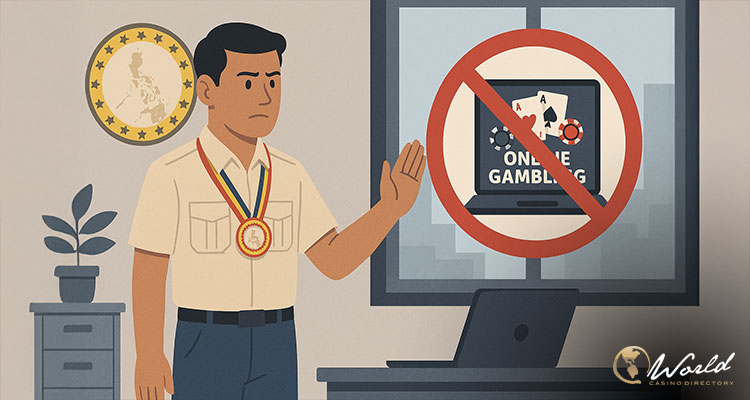The Department of the Interior and Local Government (DILG) has implemented a sweeping ban on online gambling in the Philippines, barring all personnel, employees of attached agencies, and elected or appointed officials from local government units (LGUs) from accessing or participating in such activities. The order, issued under Memorandum Circular No. 2025-082, takes effect immediately and warns that violations will result in administrative and/or criminal charges under applicable laws and regulations.
Policy Expands Previous Casino Ban to Online Platforms
The ban extends beyond the DILG central office to agencies under its jurisdiction, including the Philippine National Police, Bureau of Jail Management and Penology, Bureau of Fire Protection, National Youth Commission, Philippine Commission on Women, National Commission on Muslim Filipinos, Philippine Public Safety College, and the National Police Commission.
Interior Secretary Jonvic Remulla stressed that both casinos and online gambling compromise the integrity of public service. Citing the 1987 Constitution, he underscored the need for public servants to remain accountable to the people. “Public office is a public trust. Engaging in online gambling undermines the credibility of our institutions and diverts public servants from their sworn duty to serve with integrity, competence, and loyalty,” the memorandum stated.
The directive builds on the Office of the President’s Memorandum Circular No. 06, series of 2016, which considered the mere presence of government personnel in casinos as “conduct prejudicial to the best interest of the service” unless officially required. According to the DILG, the accessibility of online gambling now presents “a similar, if not greater, threat” to the ethical standards expected of public officials.
The department said it has received reports of officials and employees engaging in online gambling, a practice it considers damaging to the credibility of government service. By explicitly including online platforms in the prohibition, the DILG aims to close a regulatory gap and align policy with evolving risks in the digital age.
Senate Majority Leader Joel Villanueva welcomed the move, calling it “a step in the right direction” that provides clear guidelines across all levels of local government. He credited the DILG with responding to his earlier appeal for an explicit prohibition and urged the Civil Service Commission to adopt a similar nationwide policy. Villanueva cautioned that online gambling can lead to addiction, financial distress, and impaired decision-making — risks that can undermine responsible governance.
Strong Reactions and Calls for Broader Action
CIBAC party-list Representative Eddie Villanueva also praised the DILG’s directive, describing it as a strong message that public servants must uphold the highest standards of integrity and moral responsibility. He reiterated his push for a complete nationwide ban, arguing that “the social cost of gambling addiction far outweighs whatever revenue it generates for the state.” His House Bill 637 seeks to outlaw online gambling entirely rather than simply regulate or tax it.
The Catholic Bishops’ Conference of the Philippines has taken an even more forceful stance, urging the government to declare all forms of online gambling illegal, framing the issue as “a deep and widespread moral crisis.”
Meanwhile, President Ferdinand Marcos Jr. has indicated that while an outright ban may not be the immediate solution, he plans to convene a “conclave” of stakeholders — including the Church, educators, parents, law enforcement, and addiction experts — to develop a comprehensive policy. As reported by Inquirer.net, Malacañang officials said the President would not rush a decision and would weigh all perspectives, particularly given the country’s reliance on e-gaming revenues, which generated P51 billion in just the first quarter of the year.



